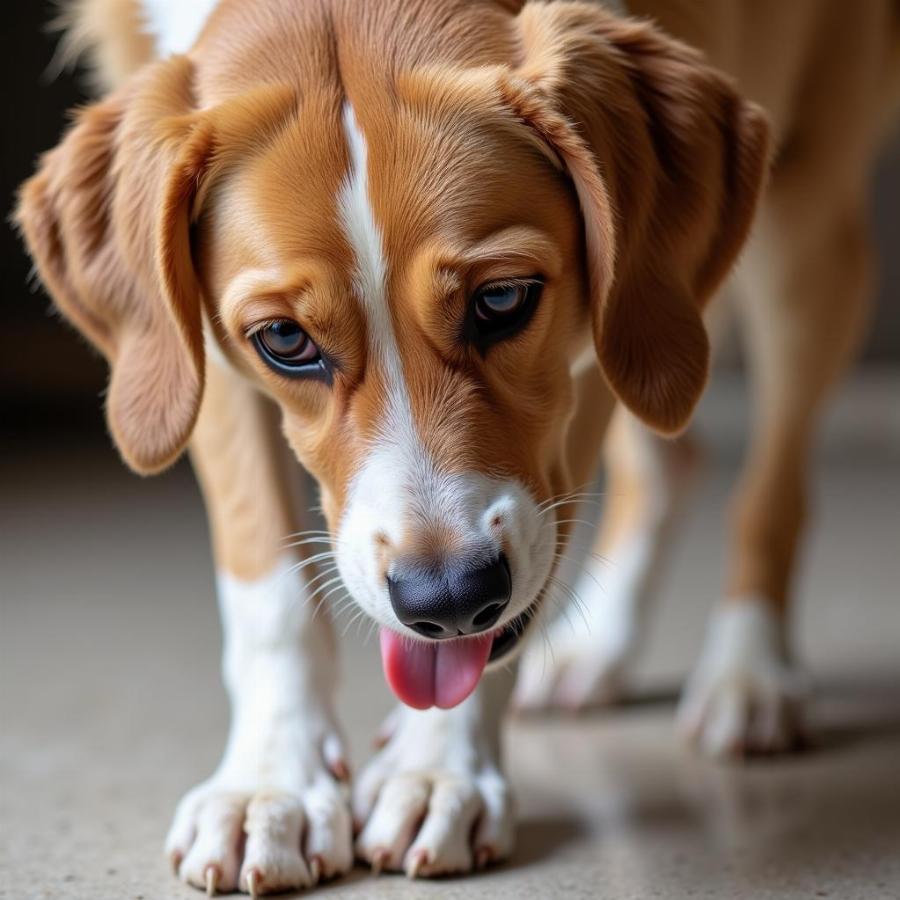Urinary incontinence in dogs, or the inability to control their bladder, can manifest in various ways, including peeing while sleeping. This can be a distressing issue for both dog and owner. Understanding the potential causes, from simple urinary tract infections to more complex neurological conditions, is the first step in finding a solution. Let’s delve into the reasons why your dog might be experiencing this issue and what you can do to help.
Why Does My Dog Pee in Their Sleep?
Several factors can contribute to a dog urinating while sleeping. Age, breed, underlying health conditions, and even medications can play a role. While occasional accidents can happen, consistent nighttime urination warrants a visit to the veterinarian. They can accurately diagnose the problem and recommend the best course of treatment. Common causes include urinary tract infections (UTIs), bladder stones, hormonal imbalances, spinal cord injuries, and cognitive decline in senior dogs.
Urinary Tract Infections (UTIs) in Dogs
UTIs are a frequent culprit behind inappropriate urination, including nighttime accidents. These infections cause inflammation and irritation, leading to increased urgency and frequency of urination, even during sleep. Symptoms include frequent urination, straining to urinate, blood in the urine, and licking the genital area.
 Chó bị viêm đường tiết niệu
Chó bị viêm đường tiết niệu
Bladder Stones and Urinary Incontinence
Bladder stones can irritate the bladder lining and cause involuntary leakage, particularly during sleep. These stones form from minerals in the urine and can vary in size. Symptoms can include bloody urine, straining to urinate, and abdominal pain.
Hormonal Imbalances and Nighttime Urination
Hormonal imbalances, particularly in spayed females, can weaken the sphincter muscles that control urination. This can lead to leakage, especially when the dog is relaxed or sleeping.
Spinal Cord Injuries and Urinary Control
Spinal cord injuries can disrupt the nerve signals that control bladder function. This can result in incontinence, including nighttime urination.
Cognitive Dysfunction Syndrome (CDS) and Incontinence
Senior dogs can develop CDS, a condition similar to Alzheimer’s disease in humans. This can affect their memory and learned behaviors, including house-training. Incontinence, both during the day and night, is a common symptom.
How to Manage Canine Urinary Incontinence
Managing canine urinary incontinence depends on the underlying cause. Your veterinarian can recommend the best course of action after a thorough examination and diagnosis. Treatment options may include medications, surgery, dietary changes, or behavioral modifications.
Medications for Urinary Incontinence
Certain medications can help strengthen the bladder sphincter muscles and reduce involuntary urination.
Surgical Interventions for Bladder Issues
In some cases, surgery may be necessary to remove bladder stones or correct anatomical abnormalities.
Dietary Changes for Urinary Health
Adjusting your dog’s diet can help prevent the formation of bladder stones and improve overall urinary health.
Behavioral Modifications for House-Training
For dogs with CDS or other behavioral issues, retraining and positive reinforcement can be helpful in managing incontinence. 12 signs your dog loves you can help you understand your dog better.
Conclusion
Can a dog pee in their sleep? Unfortunately, yes. While occasional accidents are normal, frequent nighttime urination can signal an underlying health issue. Consult your veterinarian to determine the cause and find the best solution for your furry friend. Early diagnosis and treatment can significantly improve your dog’s comfort and quality of life. Addressing incontinence promptly can also prevent further complications and ensure a happy, healthy relationship with your beloved companion. Remember to create a comfortable and supportive environment for your dog, especially if they are struggling with incontinence. A dog anxiety bed can help.
FAQ
- Is it normal for a puppy to pee in their sleep? While puppies are still learning bladder control, frequent nighttime urination should be addressed with a vet.
- Can stress cause a dog to pee in their sleep? Yes, stress and anxiety can contribute to incontinence in dogs.
- What are the signs of a UTI in dogs? Frequent urination, straining, blood in the urine, and licking the genital area are common signs.
- How can I clean up dog urine effectively? Use an enzymatic cleaner specifically designed for pet urine to eliminate odors and prevent re-soiling.
- Are there any home remedies for dog incontinence? Consult your vet before trying any home remedies. Some herbal supplements may be helpful, but a proper diagnosis is essential.
- Can spaying or neutering cause incontinence? While it’s a potential side effect, it’s not the primary cause in most cases.
- How often should I take my dog out to pee? This depends on age, breed, and health. Generally, adult dogs should be taken out every 4-6 hours.
Further Reading
You might also be interested in reading more about related topics like why does my dog urinate in her sleep or why does my dog pee on his bed.
Beaut Dogs: Your Trusted Source for Canine Information
Beaut Dogs is your one-stop resource for everything related to dog care. We provide reliable and in-depth information to help you understand and care for your canine companion. When you need support, don’t hesitate to contact us via Email: [email protected] to receive detailed and accurate answers from Beaut Dogs.